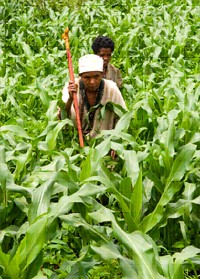afrol News, 9 April - Food security and self-sufficiency would be a priority for Africa in the next five years, with investments eyed for agricultural to nourish its populations and create the much needed employment.
African Ministers of Finance, Economic Planning and Development have recently resolved to give pride of place to the high potential of the agricultural sector to create jobs, by granting subsidies to small scale farmers through the provision of certain inputs and by adopting measures to stabilise markets for farmers who produce surpluses.
The "Resolution 11" was adopted at the conclusion of the Annual Session of African Ministers of Finance, Planning and Economic Development held last week in Lilongwe, Malawi, under the auspices of the African Union (AU) and the UN Economic Commission for Africa (UNECA).
The resolution reaffirms the commitment of African Ministers to boosting investment in agriculture and allocating a substantial share of national budgets to this vital sector, as provided for in the Comprehensive Africa Agriculture Development Programme (CAADP) established at the 2003 AU Summit in Maputo.
Bearing the title "Towards Realizing a Food Secure Africa within Five Years", Resolution 11 calls for a set of concrete measures such as speeding up the implementation of the African mechanism for financing the development of fertilizers.
With a view to enhancing the competitiveness of African farmers, Resolution 11 also stipulates that priority should be given to local producers rather than international charity organization when it comes to provisioning from food aid suppliers.
"These African farmer support measures fall within the broader context of articulating appropriate strategies to promote job creation within a framework where the spectacular growth rates achieved in the past decade have impacted only marginally on reducing joblessness in most African countries," the ministerial conference had noted.
The conference was one of the highlights of the many initiatives that African leadership is taking in ensuring not only that its meets its commitments to the Millennium Development Goals (MDGs), by 2015, but also in taking the lead in Africa's development initiatives.
Held back by years of war, disease, famine and hunger, African leaders are also becoming aware of the need to stabilise governance in their respective states, in order for true development to take a healthy rooting. For instance, the seriousness and active involvement of regional blocks in putting out fires at the different countries, especially in the west, central and southern regions is testimony of the continents resolve to grow and conserve democratic institutionalisation as a way of development.
The meeting that came out with resolution 11, is the third time running that the AU and UNECA are jointly holding the Conference of African Ministers of Finance, Economic Planning and Development. This year's discussion theme was "Promoting High-level Sustainable Growth to Reduce Unemployment in Africa" and the outcome was a Ministerial Policy Statement which reaffirmed the centrality of job creation in growth policies.
The Ministerial Policy Statement highlights the need to pay particular attention to such drivers of growth as human capital development, technological innovation and physical infrastructure. In the view of the African Ministers of Finance, Planning and Economic Development, the private sector should play a more significant role in job creation within an environment enabled by good governance.
Employment promotion strategies should, accordingly, take into account, as outlined in the statement, the constraints of climate change. They should also be sustained by the development of statistics to improve policy formulation and the institution of effective machinery to combat illicit financial flows which deprive African countries of resources vital to their development.
Particular attention was given to the practical implementation of policies adopted by the Annual Joint meetings of the AU and UNECA. It was proposed, in that regard, that member States should henceforth report to each Ministerial session on the effort that they have made to implement decisions adopted at the preceding session.
By staff writer
© afrol News

 Pan-Africanism and Palestine solidarity: A history of anti-imperialist struggle
Pan-Africanism and Palestine solidarity: A history of anti-imperialist struggle
